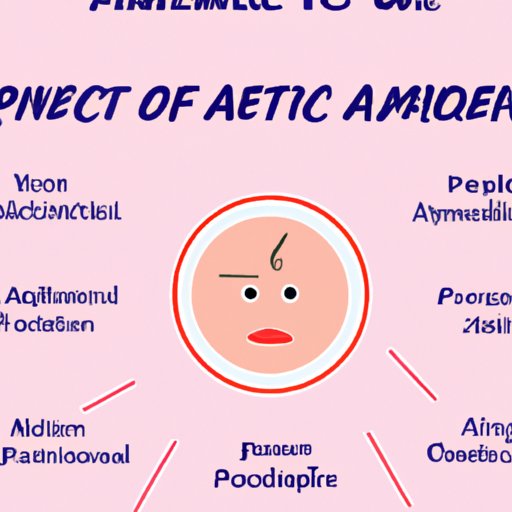Introduction
Acne is one of the most common skin conditions, affecting millions of people around the world. It can range from mild to severe and can cause physical discomfort as well as emotional distress. As such, understanding how to manage and prevent acne is important for maintaining healthy skin.
In this article, we’ll explore the causes and treatments of acne, examine the different types of acne, investigate when acne is likely to disappear, look at natural therapies for treating acne, and review the latest research on acne treatments and prevention.
Exploring the Causes and Treatments of Acne
Acne is caused by a variety of factors, including hormonal imbalance, genetics, stress, and diet. Excess sebum production, blocked pores, and inflammation can all contribute to the development of acne.
Hormonal imbalance is one of the most common causes of acne. During puberty, hormones like testosterone are produced in higher amounts, which can lead to an increase in oil production and clogged pores. This can result in breakouts.
Genetics can also play a role in determining whether or not someone develops acne. If either parent had acne, their children are more likely to get it as well. Additionally, some people are simply more prone to developing acne than others.
Stress can also be a factor in the development of acne. When we’re stressed, our bodies produce more cortisol, which can trigger an increase in oil production and lead to breakouts.
Finally, diet can have an effect on acne. Eating a diet high in processed foods, sugar, and dairy can worsen acne. On the other hand, eating a balanced diet with plenty of fruits and vegetables can help reduce breakouts.
Treatments for acne range from topical creams and ointments to oral medications and laser treatments. Topical treatments work by reducing inflammation and unclogging pores. Oral medications, such as antibiotics and birth control pills, can also be used to treat acne. Laser treatments can be effective in reducing breakouts, but they can be expensive and may not be covered by insurance.

Examining the Different Types of Acne and How to Manage It
There are several different types of acne, each with its own characteristics and treatment methods. The most common types of acne include whiteheads, blackheads, cysts, papules, and pustules.
Whiteheads are small, flesh-colored bumps that form when dead skin cells and oil become trapped in a pore. They often appear on the forehead, nose, and chin. Whiteheads can be treated with topical creams and ointments.
Blackheads are slightly larger than whiteheads and appear as dark spots on the skin. They form when a pore becomes clogged and the top layer of skin darkens. Blackheads can be treated with topical treatments, exfoliation, and facial masks.
Cysts are large, pus-filled lesions that can be painful and tender to the touch. They form deep within the skin and can linger for weeks or even months. Cysts should be treated with prescription medications or laser treatments.
Papules are small, red bumps that can form on the face, chest, back, or shoulders. They are usually tender to the touch and can be treated with topical creams and ointments.
Pustules are similar to papules, but they are filled with pus. They are often red and inflamed, and can be treated with topical treatments and antibiotics.
Managing acne can be a challenge, but there are several strategies that can help. Keeping the skin clean and moisturized can help reduce breakouts. Avoiding harsh cleansers and exfoliants can also help. Additionally, limiting stress and eating a balanced diet can help keep skin clear.

Understanding When Acne Is Likely to Disappear
The duration of acne varies from person to person. Factors such as age, gender, and skin type can all affect the duration of acne. In general, acne tends to last longer in adults than in teenagers.
For most people, acne begins during puberty and gradually decreases over time. For some, acne may persist into adulthood. However, for most people, acne disappears by the time they reach their early twenties.
Investigating Natural Therapies for Treating Acne
In addition to traditional treatments, there are several natural therapies that can help reduce the severity of acne. Making dietary changes can be beneficial for managing acne. Eating a diet rich in fruits, vegetables, and healthy fats can help keep skin clear. Additionally, avoiding processed foods, sugar, and dairy can help reduce breakouts.
Herbal remedies, such as green tea, chamomile, and aloe vera, can also help reduce inflammation and soothe the skin. Homeopathic remedies, such as zinc, sulfur, and tea tree oil, can also be used to treat acne.

Looking at the Latest Research on Acne Treatments and Prevention
Recent research has revealed several new treatments for acne. Topical treatments, such as retinoids, benzoyl peroxide, and salicylic acid, can help reduce inflammation and unclog pores. Oral medications, such as antibiotics and hormonal contraceptives, can also be used to treat acne.
Laser treatments, such as blue light therapy and photodynamic therapy, can also be effective in reducing breakouts. These treatments are often expensive and may not be covered by insurance.
Conclusion
Acne can be a frustrating problem for many people. By understanding the causes and treatments of acne, as well as when it may go away, it is possible to manage and prevent breakouts. Natural therapies, such as dietary changes and herbal remedies, can also be helpful in treating acne. Finally, the latest research has revealed several new treatments, including topical medications, oral medications, and laser treatments.
To manage acne, it is important to keep the skin clean and moisturized, avoid harsh cleansers and exfoliants, limit stress, and eat a balanced diet. With these tips, you can keep your skin looking and feeling healthy.


